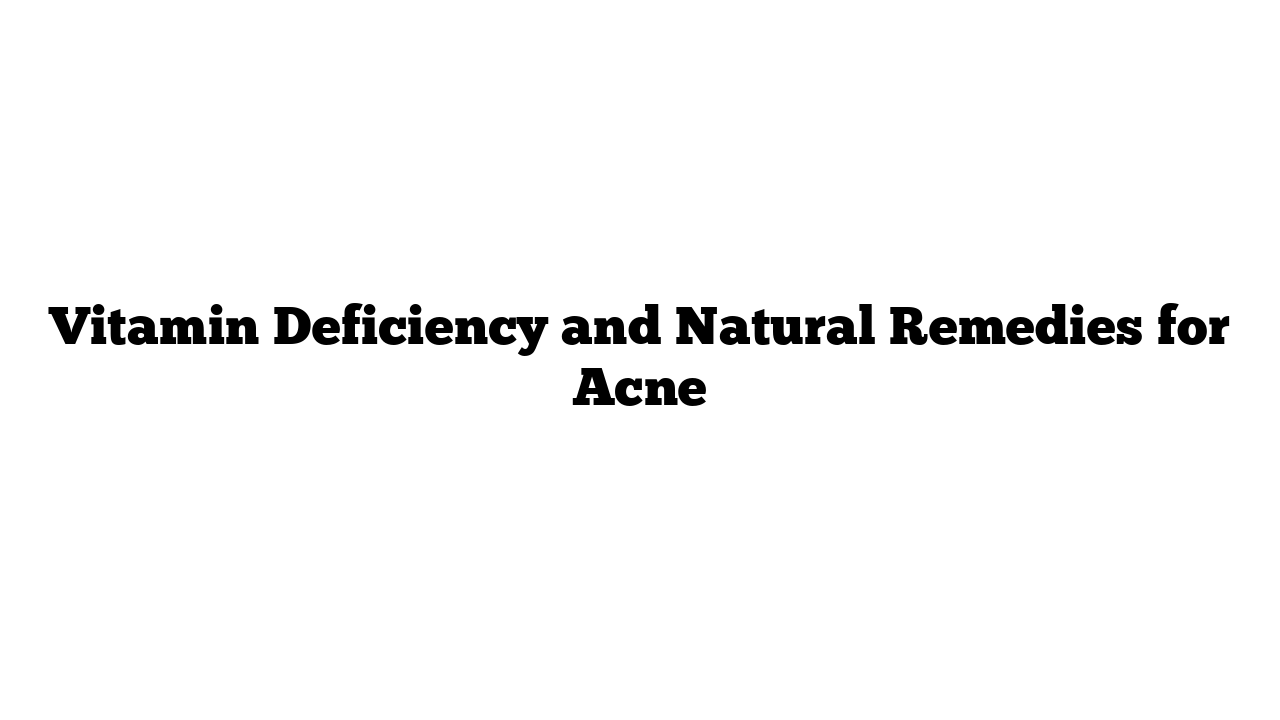Natural Remedies for Acne While Vitamin Deficiency
Acne can have a profound effect on self-esteem, especially during adolescence. Many people, including myself, have struggled with it during formative years. While there are multiple factors behind acne, understanding its causes and addressing deficiencies can make a significant difference. Here, we explore the root causes, the role of vitamin deficiencies, and natural remedies to help clear your skin effectively.
What Exactly Is Acne?
Acne occurs when the sebaceous glands (oil glands) in your skin produce too much sebum (oil). This excess oil, combined with inflammation and bacteria, results in pimples, blackheads, and whiteheads.
Key triggers for acne include:
- Hormonal fluctuations (e.g., puberty or conditions like PCOS).
- High-carb diets, which spike insulin levels and increase androgen production.
- Inadequate skincare practices.
The Surprising Link Between Vitamin D Deficiency and Acne
One of the most overlooked contributors to acne is a vitamin D deficiency. Vitamin D plays a critical role in regulating skin health, and its deficiency can exacerbate acne in several ways:
- Bacterial Regulation: Vitamin D has natural antibacterial properties, helping to keep harmful bacteria in check.
- Sebum Reduction: Adequate levels of vitamin D can reduce excess oil production, preventing clogged pores.
- Hormone Balance: It helps regulate androgens, particularly in conditions like PCOS.
- Anti-Inflammatory Properties: Vitamin D reduces inflammation, shrinking swollen sebaceous glands.
Why Are Most People Deficient in Vitamin D?
Despite its importance, vitamin D deficiency is common, especially in teens and adults. Factors contributing to this include:
- Lack of sun exposure.
- High-carb diets that deplete vitamin D.
- Obesity, which can lower circulating vitamin D levels.
- Darker skin tones, which absorb less sunlight for vitamin D production.
Pro Tip: You can’t rely on diet alone for vitamin D, as most foods provide insufficient amounts.
How to Naturally Combat Acne
Here are science-backed remedies to reduce acne and boost skin health:
1. Supplement with Vitamin D3
Take approximately 20,000 IU of vitamin D3 daily. This can significantly reduce inflammation and balance sebum production. Consult your doctor for appropriate dosing.
2. Adopt a Low-Carb Diet
High-carb and sugary foods feed acne-causing bacteria. Reducing these foods helps stabilize insulin levels, which, in turn, reduces androgens.
3. Try Intermittent Fasting
Limit eating to two or three meals daily without snacking. This method lowers insulin spikes, improves hormone balance, and reduces acne.
4. Gentle Skincare
Avoid over-scrubbing or using harsh soaps. Over-sanitizing can strip your skin of good bacteria, worsening inflammation. Opt for gentle cleansers and pat your skin dry.
5. Incorporate Vitamin D-Rich Foods
While supplements are most effective, foods like cod liver oil, salmon, and other fatty fish can also contribute to your vitamin D intake. These foods are doubly beneficial as they often contain vitamin A, another nutrient vital for clear skin.
Foods to Focus On
If you’re reducing carbs, focus on:
- Healthy fats: Avocado, olive oil, and nuts.
- High-protein options: Eggs, lean meats, and fish.
- Vegetables: Spinach, kale, and broccoli.
A Word of Caution
Medications like Accutane (a synthetic form of vitamin A) are sometimes used to treat acne but come with severe side effects, such as liver damage and mental health risks. Natural methods are safer and equally effective in most cases.
Transform Your Skin Today
By addressing vitamin deficiencies, adjusting your diet, and following a gentle skincare routine, you can achieve clearer, healthier skin naturally. For more trusted health insights, visit medicaltimes.io.
Top FAQs on Acne and Vitamin Deficiency
- Can vitamin D cure acne completely?
Vitamin D can significantly reduce acne by addressing inflammation and hormonal imbalances, but a comprehensive approach (diet and skincare) is necessary for the best results. - How much vitamin D should I take daily for acne?
Generally, 20,000 IU of vitamin D3 is effective, but consult your doctor for personalized advice. - Is diet alone enough to clear acne?
While diet plays a crucial role, combining it with vitamin D supplementation and proper skincare yields better outcomes. - Can teenagers safely take vitamin D supplements?
Yes, teenagers can take vitamin D under medical guidance, as deficiencies are common in this age group. - Are vitamin D-rich foods sufficient?
Foods alone typically provide insufficient vitamin D. Sun exposure and supplements are often necessary. - How does fasting help acne?
Intermittent fasting reduces insulin spikes, which helps regulate androgen levels and decreases inflammation. - Should I avoid all carbs for clear skin?
Not entirely. Focus on reducing refined carbs and sugars, which are the primary culprits. - Why does scrubbing make acne worse?
Over-scrubbing irritates the skin, removes beneficial bacteria, and increases inflammation, worsening acne. - What other vitamins help with acne?
Vitamin A, zinc, and omega-3 fatty acids are also beneficial for reducing acne. - Can darker-skinned individuals benefit from vitamin D supplements?
Yes, darker skin absorbs less sunlight for vitamin D production, making supplements even more important.
